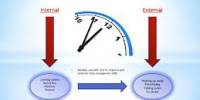Jet lag is a temporary sleep disorder that occurs when your internal body clock is out of sync with your destination’s time zone. It is a physiological condition caused by changes in the body’s circadian rhythms caused by rapid trans-meridian (east-west or west-east) travel. It frequently occurs following long-distance flights that cross multiple time zones, disrupting your circadian rhythm—the natural biological clock that regulates various physiological and behavioral processes over a 24-hour cycle.
For example, someone flying from New York to London, or west to east, perceives the time to be five hours earlier than local time, while someone flying from London to New York, or east to west, perceives the time to be five hours later than local time.
The phase shift from east to west is referred to as the phase delay of the circadian circle, whereas the phase shift from west to east is referred to as the phase advance of the circadian circle. When traveling to the east, most people find it more difficult to adjust their time zones. Previously, jet lag was classified as a circadian rhythm sleep disorder.
Symptoms of jet lag can include:
- Sleep disturbances: Difficulty falling asleep or staying asleep at the destination’s nighttime.
- Daytime fatigue: Feeling tired and lethargic during the day.
- Difficulty concentrating: Impaired cognitive function, difficulty focusing, and memory lapses.
- Gastrointestinal issues: Upset stomach, indigestion, and changes in appetite.
- Mood disturbances: Irritability, mood swings, and general malaise.
Jet lag can last several days before the traveler is fully adjusted to the new time zone; a recovery period of one day per time zone crossed is recommended. Jet lag is especially problematic for airline pilots, flight crew, and frequent travelers. Airlines have policies in place to combat pilot fatigue caused by jet lag.
The term “jet lag” was coined because it was uncommon to travel far and fast enough to cause desynchronosis prior to the arrival of passenger jet aircraft. Travel by propeller-driven aircraft, ship, or train was slower and had a shorter range than jet flights, so it did not contribute significantly to the problem.
To help minimize the effects of jet lag, you can try the following strategies:
- Adjust your sleep schedule before departure: Gradually shift your sleeping and eating times closer to those of your destination in the days leading up to your trip.
- Stay hydrated: Drink plenty of water before, during, and after your flight to help counteract the dehydrating effects of air travel.
- Get sunlight exposure: Spend time outdoors in natural daylight upon arrival at your destination to help reset your internal body clock.
- Take short naps: If needed, take short naps to help combat fatigue, but avoid long naps that can interfere with your ability to sleep at night.
- Use sleep aids cautiously: While some people find sleep aids helpful, they can have side effects and may not be suitable for everyone. Consult with a healthcare professional before using any medication.
















